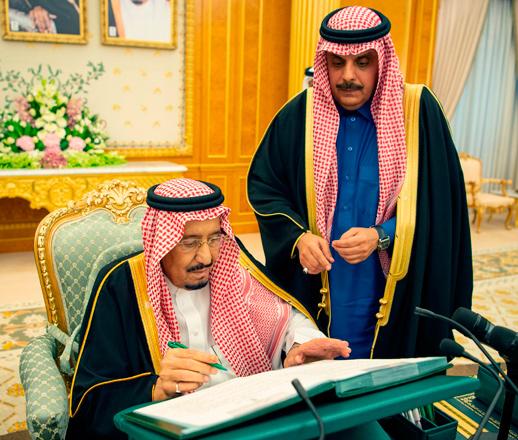You are here
Saudi Arabia expects budget deficit for sixth straight year
By AFP - Dec 18,2018 - Last updated at Dec 18,2018

This handout photo provided by the Saudi Press Agency on Tuesday shows Saudi Arabia's King Salman Bin Abdulaziz signing on the 2019 budget following a meeting in Riyadh (AFP photo)
RIYADH — Saudi Arabia on Tuesday announced an expansionary budget for 2019 but projected a shortfall for the sixth year in a row due to low oil prices.
The budget projects a deficit of $35 billion, still about 32 per cent lower than the estimated deficit for the current calendar year.
Spending is estimated at $295 billion, the largest in the oil-rich kingdom's history, while revenues, mostly from oil, are estimated at $260 billion, said a statement read by King Salman.
Saudi Arabia, which has introduced economic reforms aimed at reducing its dependence on oil, has posted budget shortfalls since 2014 when crude prices crashed.
"We are determined to pursue economic reforms, control fiscal management, bolster transparency and strengthen the private sector," the king said in a brief statement to the cabinet.
The finance ministry said the kingdom, which is pumping about 10.5 million barrels of oil per day, succeeded in reducing the estimated budget deficit in 2018 by 31 per cent to $36 billion due to the partial rebound in crude prices.
The ministry also said the country's economy, which contracted by 0.9 per cent last year, grew by 2.3 per cent.
It expects growth to hit 2.6 per cent in 2019.
The ministry said the Gulf kingdom would resort to drawing on state reserves and borrowing to plug the deficit.
Related Articles
Saudi Arabia announced a 2015 budget with a huge deficit at the weekend as the world's largest crude exporter begins to feel the impact of its own decision not to shore up oil prices.
KUWAIT CITY — Kuwait, a member of the Organisation of Petroleum Exporting Countries (OPEC), projected a record budget deficit for the fiscal
Billionaire Prince Alwaleed Bin Talal has lashed out at the Saudi fiscal policy after projecting the largest ever budget deficit for 2015 following the slump in oil prices.













